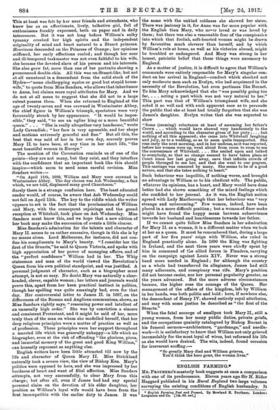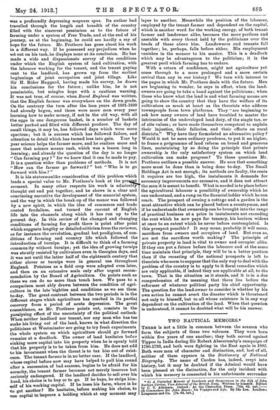ENGLISH FARMING.•
ME. PEOTHEBO'S masterly book suggests at once a comparison with one of its predecessors. Eleven years ago Sir H. Rider Haggard published in his .Rural England two large volumes surveying the existing conditions of English husbandry. It • English Farming Poet and Present. By Rowland E. Prothero. London Lougiusus and Co. [1:3. 6d. net.]
was a profoundly depressing magnum, opus. Its author had travelled through the length and breadth of the country filled with the sincerest pessimism as to the future of farming under a system of Free Trade, and at the end of his journey, as at the beginning. he could see hardly a ray of hope for the future. Mr. Prothero has gone about his work in a different way. If be posssesed any prejudices when be set out on his task, he displays none at its conclusion. He has made a wide and dispassionate survey of the conditions under which the English system of land cultivation, with the labourer working for the tenant, and the tenant paying rent to the landlord, has grown up from the earliest beginnings of joint occupation and joint tillage. Like Sir H. Rider Haggard, having made his survey, he draws his conclusions for the future ; unlike him, he is not pessimistic, but mingles hope with a cautious warning. It was not true, of course, when Rural England was written, that the English farmer was everywhere on the down grade. On the contrary the turn after the lean years of 1891-1899 had already begun, and there were more men every year learning how to make money, if not in the old way, with all the eggs in one dangerous basket, in a number of baskets better packed and filled with different produce. The day of small things, it may be, has followed days which were more spacious ; but it is success which has followed failure, and -attention to detail which has turned loss into gain. Year by year science helps the farmer more, and he realizes more and snore that science means cash, which was a lesson long in learning; and already the question of the day is no longer " Can farming pay ? " for we know that it can be made to pay. It is a question wider than problems of methods. It is not " How can the farmer go forward? " but " Who is to go forward with him ? "
It is his statesmanlike consideration of this problem which lends a special value to Mr. Prothero's book at the pre t moment. In many other respects his work is admirably thought out and put together, and he shows in a clear and convincing narrative the development of the manorial system, and the way in which the break-up of the manor was followed by a new spirit, in which the idea of commerce and trade ousted feudalism, and turned the current of English life into the channels along which it has run up to the present day. In this review of the changed and changing conditions of farming for profit there is point after point which suggests lengthy or detailed criticism from the reviewer, as for instance the revolution, gradual but prodigious, of con- ditions of farming and country life which followed the introduction of turnips. It is difficult to think of a farming community without turnips; yet the idea of growing turnips was stoutly resisted by cultivators even in Georgian days, and it was not until the latter half of the eighteenth century that either clover or turnips were in general use throughout England. Potatoes as a field crop were adopted even later, and then on an extensive scale only after urgent recom- mendation by the Board of Agriculture. On points such as these we can do no more than touch here. We pass to a comparison most ably drawn between the condition of agri- culture in the late 'eighties and conditions as we see them to-day. The great contrast between the two periods is in the different stages which agriculture has reached in its partial recovery from a period of acute depression. The great resemblance, as Mr. Prothero points out, consists in the paralysing effect of the uncertainty of the political outlook. When neither landlord nor tenant, nor any man who has toe snake his living out of the land, knows in what direction the politicians at Westminster are going to try fresh experiments the whole system on which agriculture should go forward remains at a deadlock. The owner of land hesitates befor sinking more capital into his property when he is openly told that his property is to be taken from him. He does not add to his investment when the threat is to tax him out of exist- ence. The tenant farmer is in no better case. If the landlord, Whose capital before now may have helped to pull him round after a succession of bad seasons, begins to be afraid for his security, the tenant farmer becomes not merely insecure but seriously endangered. If the landlord decides to sell over his Bead, his choice is to buy or to go. If he buys, he strips him- self of his working capital. If he loses his farm, where is he
'to get another? He hesitates,•before making his choice, to 'use capital to improve a holding which at any moment may
]apse to another. Meanwhile the position of the labourer, employed by the tenant farmer and dependent on the capital, which is another word for the working energy, of both tenant farmer and landowner alike, becomes the more perilous and unstable with every threat held by the politicians over the heads of those above him. Landowners and tenants fall together; he, perhaps, falls before either. His employment vanishes in the menace to his master. This is a deadlock which may be advantageous to the politician ; it is the greatest peril which farming has to endure.
With a return of confidence, might not agriculture yet come through to a more prolonged and a more certain revival than any in our history ? We turn with interest to the pages in which Mr. Prothero deals with the future. Men are beginning to wonder, he says in effect, when the land- owners are going to take a hand against the politicians ; when those who know what the land is and what farming means are going to show the country that they have the welfare of its cultivators as much at heart as the theorists who address townspeople from town platforms. They "are beginning to ask how many owners of land have troubled to master the intricacies of the undeveloped land duty, of the single tax, or of site values ; or have made themselves competent to explain their injustice, their fallacies, and their effects on rural districts." Why have they formulated no alternative policy ? Would it not be mere ordinary prudence, to put it no higher, to frame a programme of land reform on broad and generous lines, maintaining by so doing the principle that private ownership is the only satisfactory system on which land cultivation can make progress ? To those questions Mr. Prothero outlines a possible answer. He sees that something more must be done than is being done to-day. The Small Holdings Act is not enough; its methods are faulty, the rents it requires are too high, the instalments it demands for necessary improvements are excessive, and it does not attract the man it is meant to benefit. What is needed is to place before the agricultural labourer a possibility of ownership which he can understand, and a rung on the financial ladder which he can reach. The prospect of owning a cottage and a garden is the most attractive which can be placed before a countryman, and if he understands that ownership can be brought into the range of practical business at a price in instalments not exceeding the rent which be now pays for tenancy, his horizon widens at once to an extent which he never before contemplated. Is this prospect possible ? It may mean, probably it will mean, sacrifices from owners and occupiers of land. But even so, are not the sacrifices worth making ? The 'principle of private property in land is vital to owner and occupier alike. If they can put a future before the labourer and at the same time maintain that principle, they will be in a better position than if the recasting of the national prospects is left to theorists who seem to suppose that the only way to deal with the problem of the country is to apply to it fiscal remedies which are only applicable, if indeed they are applicable at all, to the town. That is the situation as it stands, and it is in a due comprehension of its meaning that there lies before the reformer of whatever political party his chief opportunity. The question for the land-owner to consider is whether by his own action he cannot avert the disaster which is threatened not only to himself, but to all whose existence is in any way dependent on the cultivation of the land. When that question is understood, it cannot be doubted what will be his answer.











































 Previous page
Previous page